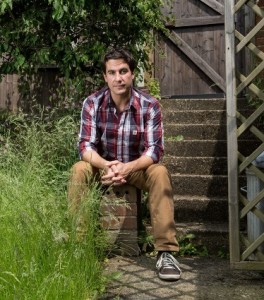Fin Kennedy
 Fin Kennedy has been busy. “It all came about because of a chance meeting with the Culture Minister Ed Vaizey.” He’s referring to In Battalions, his report report about the effect of Arts Council cuts on new plays and playwriting in England.
Fin Kennedy has been busy. “It all came about because of a chance meeting with the Culture Minister Ed Vaizey.” He’s referring to In Battalions, his report report about the effect of Arts Council cuts on new plays and playwriting in England.
Kennedy is a playwright, teacher, University tutor, writer-in-residence and soon-to-be Co-Artistic Director of London’s intra-cultural Tamasha Theatre company.
“I was at a meeting that Ed Viazey was at, when out of the blue he said that the Arts Council cuts were having no impact on theatre. I was dumbfounded. His view was that theatre was thriving. To the lay person, yes, if you look at the big theatres and the main stages, it might seem that all is ok. But the average person might not be expected to know that current productions often have long roots into the past, that it can take years of effort to get something to the stage. The average person, yes, but it was a bit of a worry that the culture minister didn’t get it.
“Of course when you try and convince someone of something, you very quickly find yourself relying on anecdotes. In the end Vaizey told me if I found some hard evidence, he’d look at it.” That conversation became the start of the In Battalions report . The extent to which the report and campaign took off surprises Kennedy even now.
“I thought I’d just get a few quotes together from a few artistic directors. Before I knew it, it’d gone viral and offers of help were flooding in.”
One of those offers was from researcher Helen Cambell Pickford, who helped to structure a questionnaire. We got a 50% response rate to the survey and the report that was downloaded thousands of times.
The results painted a much bleaker picture than Vaizey’s one of a thriving industry, with the data and testimonies gathered show funding cuts seriously affecting new writing production and new writer development opportunities
“In a way, why would Ed Vaizey understand all that, he’s got a very broad remit – but I did the report in good faith; to start a dialogue. We didn’t really get much of a response from him – in fact nothing at all for two months – so then we circulated an open letter with big name signatories (including Helen Mirren, Michael Frayn, Sir Richard Eyre, Mike Leigh and Sir Tom Stoppard) Within 72 hours Vaizey responded…basically saying there wasn’t a problem in British theatre.”
Despite that, Kennedy was cheered by the response from industry and was prompted to conduct a further report (a Delphi study) to help find solutions from among practitoners.
“Theatre won’t die, but it will become safer… right of centre governments don’t care about lack of diversity in theatre”
“I never expected anyone to say, yes you’re right, here’s all your funding back. But I wanted to do something to start a conversation and at least mark the moment of the cuts having an impact.
“The big city playhouses might be alright, but the data shows that small regional theatres, community work, work for teenagers and children and small and medium scale touring companies are all badly dis-proportionately affected. Theatre won’t die, but it will become safer – lack of funding stifles innovation and doesn’t help to evolve the art form.
“It’s also about access and diversity – about who gets to make the work – that’s only going to get worse, but right of centre governments don’t care about lack of diversity in theatre. If theatre makers are drawn from a narrow demographic then that’s not good.
“It’s clear that Vaizey doesn’t care about the issue, or doesn’t think there is one. I’ve asked him to meet with playwrights and theatre makers but he hasn’t taken us up on it. But we’re in an emergency situation so we have to do something. And really, all I’m trying to do with all this is create some blue-sky space to think up and explore some solutions.
Kennedy is modest about his efforts with a voluntary project that has become a huge undertaking and something to juggle between his various freelance theatre work – and he’s only going to get busier as he takes up his forthcoming co-artistic directorship of Tamasha. He’s keen point out that he’ll be co-artistic director alongside existing Co-AD Sudha Bhuchar for eighteen months, helping to deliver Tamasha’s current plans as well as develop new ones, which he will fly solo with in his first season in Spring 2015.
Although it’s too early for him to go into much detail, he will be continuing with Tamasha’s focus on inter-culturality. Does that mean having a single culture/ethnicity focus is no longer relevant?
“No, but I think the world is changing really fast and theatres need to keep up. And it’s not just about culture – the elephant in the room that we don’t talk about is class; there is as much a debate around class in theatre that needs to be had as there is around ethnicity.
“The broad thrust of what I want to do is take forward the spirit of the company’s mission of providing cultural meeting points. Tamasha changed their focus in 2011 away from a purely British Asian focus to an intra-cultural approach – I believe it’s important to get cultures to talk to each other more. That said, under me British Asian artists will always have a home at Tamasha.”
Citing his own experiences, including working with Mulberry School in East London as a writer in residence, Kennedy is keen to help artists get their work on no matter what the external economic or social circumstances.
“I want to harness the power of the TDA (Tamasha Developing Artists) Network and Tamasha brand; we’re in a really unique position to help people become artist-producers and get their work out there.”






